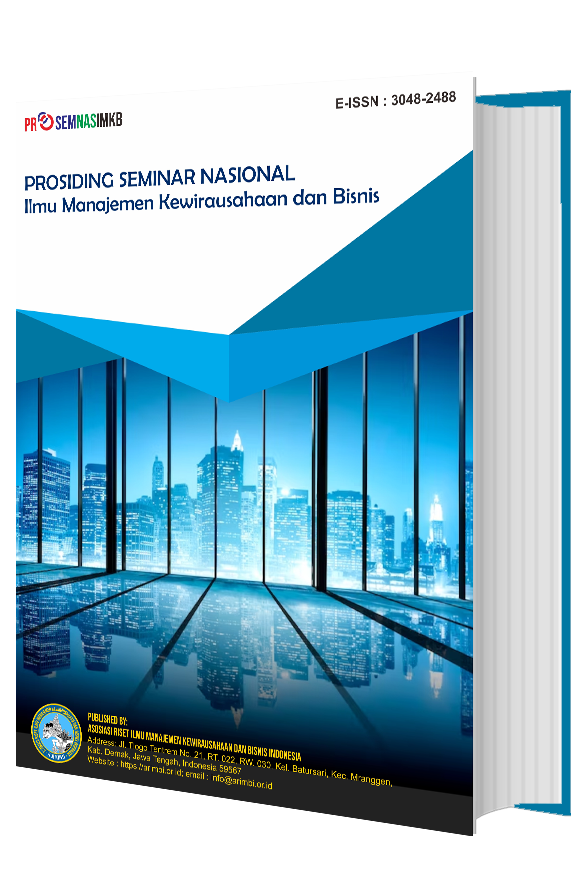Analisis Ancaman Penipuan yang Terjadi pada Penjual dalam E-comerce Bagi Dunia Bisnis di Tahun 2024
DOI:
https://doi.org/10.61132/prosemnasimkb.v1i1.11Keywords:
Business, E-commerce, FraudAbstract
This research aims to investigate the experiences and protection strategies against fraud in digital business, focusing on Anafoya store that sells clothing products. The study reveals various challenges faced by sellers in dealing with fraud in the context of digital business. This study employs a qualitative approach with a case study research design through in-depth interviews. The interview results highlight several common forms of fraud, such as non-payment in COD transactions and returns of goods that do not match their condition. To address these challenges, Anafoya store has implemented proactive protection strategies, such as strengthening payment verification procedures and tightening return policies.
Downloads
References
Brown, A., & Green, B. (2018). E-commerce fraud. CRC Press.
Chen, C., Zhang, X., & Huang, X. (2017). Combating e-commerce fraud: A combined technology and risk management strategy. In 2017 International Conference on Service Systems and Service Management (ICSSSM) (pp. 1-6). IEEE.
Cheng, L., & Wu, J. (2019). Security certification for e-commerce professionals: An analysis of benefits and challenges. International Journal of Information Management, 48, 22-29.
Choi, Y., Kim, J., & Choi, D. (2020). A multi-factor authentication system for secure e-commerce transactions. International Journal of Engineering Research & Technology, 9(6), 158-163.
Hassan, M. U., & Ahmed, H. (2018). Fraud prevention and detection in e-commerce: A systematic review. International Journal of Advanced Computer Science and Applications, 9(8), 274-282.
Han, J., & Zhu, Y. (2020). A review of e-commerce fraud detection research. In 2020 6th International Conference on Business Computing and Global Informatization (BCGIN) (pp. 53-58). IEEE.
Huang, Y., & Li, C. (2018). Fraud prevention in e-commerce: The role of consumer awareness and education. Journal of Consumer Protection and Food Safety, 13(3), 201-209.
Johnson, L., & Anderson, M. (2020). Collaborative approaches to combatting e-commerce fraud. Business Horizons, 63(5), 641-649.
Jones, T., & Taylor, K. (2019). E-commerce fraud: Trends and prevention. International Journal of Cyber Criminology, 13(2), 197-212.
Liu, H., Chen, S., & Zhang, Y. (2018). Best practices in e-commerce fraud prevention: A collaborative approach. Journal of Digital Marketing, 20(3), 279-287.
Nguyen, T. H., Le, T. T., Nguyen, D. T., & Nguyen, H. Q. (2020). E-commerce fraud detection using machine learning algorithms. In 2020 4th International Conference on Recent Advances in Signal Processing, Telecommunications & Computing (SigTelCom) (pp. 1-6). IEEE.
Park, S., & Oh, J. (2020). Collaboration between e-commerce platforms and law enforcement agencies in combating fraud. In 2020 International Conference on Information and Communication Technology Convergence (ICTC) (pp. 1167-1170). IEEE.
Smith, R., Johnson, M., & Williams, K. (2020). Understanding e-commerce fraud: Trends and implications. Journal of Financial Crime, 27(4), 1220-1238.
Wang, H., & Liu, Y. (2018). Blockchain technology in e-commerce: A potential solution to fraud and transparency issues. Journal of Digital Banking, 2(4), 301-309.
Wei, L., & Chang, C. (2021). Building trust in e-commerce: Strategies for reducing fraud. International Journal of Electronic Commerce, 25(2), 167-188.
Downloads
Published
How to Cite
Issue
Section
License
Copyright (c) 2024 Prosiding Seminar Nasional Ilmu Manajemen Kewirausahaan dan Bisnis

This work is licensed under a Creative Commons Attribution-ShareAlike 4.0 International License.






